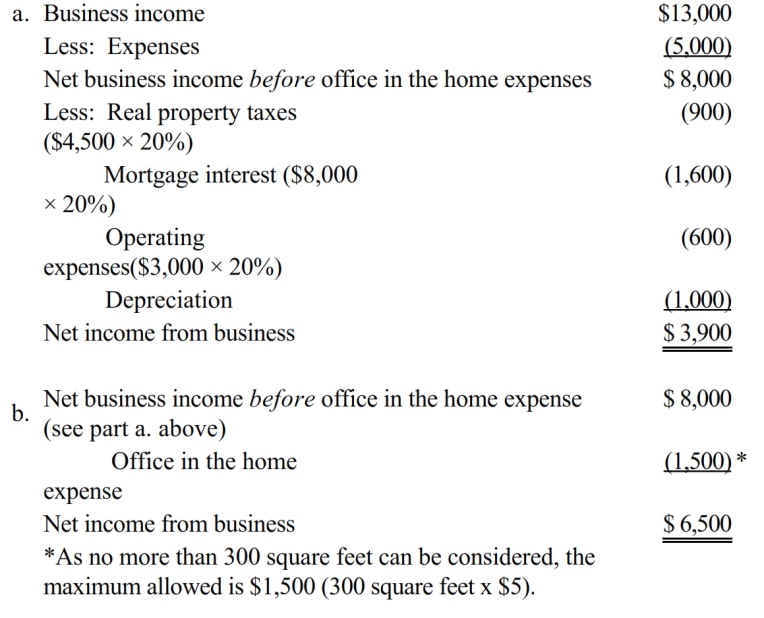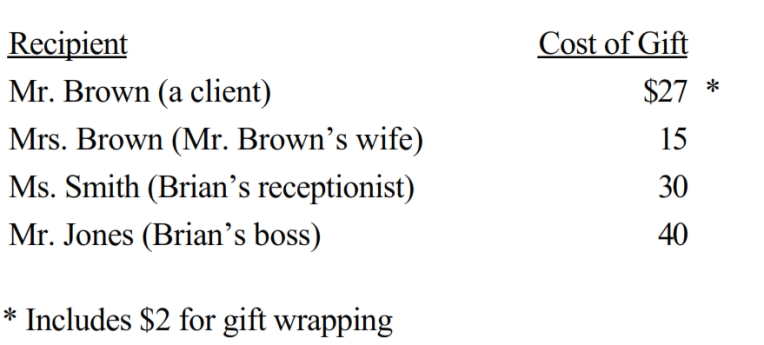Exam 9: Deductions: Employee and Self-Employed-Related Expenses
Exam 1: An Introduction to Taxation and Understanding the Federal Tax Law211 Questions
Exam 2: Working with the Tax Law102 Questions
Exam 3: Computing the Tax180 Questions
Exam 4: Gross Income: Concepts and Inclusions125 Questions
Exam 5: Gross Income: Exclusions113 Questions
Exam 6: Deductions and Losses: In General156 Questions
Exam 7: Deductions and Losses: Certain Business Expenses and Losses94 Questions
Exam 8: Depreciation, Cost Recovery, Amortization, and Depletion120 Questions
Exam 9: Deductions: Employee and Self-Employed-Related Expenses153 Questions
Exam 10: Deductions and Losses: Certain Itemized Deductions104 Questions
Exam 11: Investor Losses130 Questions
Exam 12: Tax Credits and Payments111 Questions
Exam 13: Property Transactions: Determination of Gain or Loss, Basis Considerations, and Nontaxable Exchanges285 Questions
Exam 14: Property Transactions: Capital Gains and Losses, Section 1231, and Recapture Provisions167 Questions
Exam 15: Taxing Business Income60 Questions
Exam 16: Accounting Periods and Methods88 Questions
Exam 17: Corporations: Introduction and Operating Rules108 Questions
Exam 18: Corporations: Organization and Capital Structure109 Questions
Exam 19: Corporations: Distributions Not in Complete Liquidation185 Questions
Exam 20: Corporations: Distributions in Complete Liquidation and an Overview of Reorganizations71 Questions
Exam 21: Partnerships248 Questions
Exam 22: S Corporations129 Questions
Exam 23: Exempt Entities153 Questions
Exam 24: Multistate Corporate Taxation204 Questions
Exam 25: Taxation of International Transactions146 Questions
Exam 26: Tax Practice and Ethics184 Questions
Exam 27: The Federal Gift and Estate Taxes141 Questions
Exam 28: Income Taxation of Trusts and Estates161 Questions
Select questions type
Jacob is a landscape architect who works out of his home. He wonders whether or not he will have nondeductible commuting expenses when he drives to the locations of his clients. Please comment.
Free
(Essay)
4.8/5  (34)
(34)
Correct Answer:
Jacob has no commuting expenses since his tax home is his residence. Thus, his mileage to and from the premises of his clients should be fully deductible.
For tax purposes, "travel" is a broader classification than "transportation."
Free
(True/False)
4.9/5  (30)
(30)
Correct Answer:
True
Rocky has a full-time job as an electrical engineer for the city utility. In his spare time, Rocky repairs electronic gear in the basement of his personal residence. Most of his business comes from friends and referrals from former customers, although occasionally he runs an ad in the local suburbia newspaper. Typically, the items are dropped off at Rocky's house and later picked up by the owner when notified that the repairs have been made.
The floor space of Rocky's residence is 2,500 square feet, and he estimates that 20% of this is devoted exclusively to the repair business (i.e., 500 square feet). Gross income from the business is $13,000, while expenses (other than home office) are $5,000. Expenses relating to the residence are as follows:
 What is Rocky's net income from the repair business
a. If he uses the regular (actual expense) method of computing the deduction for office in the home?
b. If he uses the simplified method?
What is Rocky's net income from the repair business
a. If he uses the regular (actual expense) method of computing the deduction for office in the home?
b. If he uses the simplified method?
Free
(Essay)
4.8/5  (43)
(43)
Correct Answer:

If an individual is ineligible to make a deductible contribution to a traditional IRA, nondeductible contributions of any amount can be made to a traditional IRA.
(True/False)
4.9/5  (39)
(39)
Regarding tax favored retirement plans for employees and self-employed persons, comment on the following:
a. The exclusion versus deduction approaches as to contributions by participants.
b. Tax-free accumulation of earnings.
c. The deferral of income tax consequences.
d. Employee versus self-employed status.
(Essay)
4.7/5  (33)
(33)
Ralph made the following business gifts during the year.  Presuming proper substantiation, Ralph's deduction is:
Presuming proper substantiation, Ralph's deduction is:
(Multiple Choice)
4.8/5  (34)
(34)
Paul is employed as an auditor by a CPA firm. On most days, he commutes by auto from his home to the office.
During one month, however, he has an extensive audit assignment closer to home. For this engagement, Paul drives directly from home to the client's premises and back. Mileage information is summarized below:
Home to office 12 miles Office to audit client 15 miles Audit client to home 10 miles
If Paul spends 20 days on the audit and provides an adequate accounting to his employer, what is his reimburseable mileage?
(Essay)
4.9/5  (37)
(37)
A taxpayer who uses the automatic mileage method to compute auto expenses can also deduct the business portion of tolls and parking.
(True/False)
4.9/5  (29)
(29)
James has a job that compels him to go to many different states during the year. It is possible that James was never away from his tax home during the year.
(True/False)
4.8/5  (38)
(38)
A statutory employee is not a common law employee but is subject to Social Security tax.
(True/False)
4.8/5  (40)
(40)
Frank established a Roth IRA at age 25 and contributed a total of $131,244 to it over 38 years. The account is now worth $376,000. How much of these funds can Frank withdraw tax-free?
(Multiple Choice)
4.8/5  (36)
(36)
In some cases it may be appropriate for a taxpayer to deduct work-related expenses as both a sole proprietor and an employee.
(True/False)
4.9/5  (43)
(43)
In the case of an office in the home deduction, the exclusive business use test does not apply when the home is used as a daycare center.
(True/False)
4.9/5  (45)
(45)
Ethan, a bachelor with no immediate family, uses the Pine Shadows Country Club exclusively for his business entertaining. All of Ethan's annual dues for his club membership are deductible.
(True/False)
4.9/5  (35)
(35)
A participant who is at least age 59 1/2 can make a tax-free qualified withdrawal from a Roth IRA after a five-year holding period.
(True/False)
4.8/5  (27)
(27)
In terms of income tax treatment, what is the difference between common law and statutory employees?
(Essay)
4.8/5  (43)
(43)
A taxpayer who maintains an office in the home to conduct his only business will not have nondeductible commuting expense.
(True/False)
4.8/5  (26)
(26)
Brian makes gifts as follows:
 Presuming adequate substantiation and no reimbursement, how much may Brian deduct?
Presuming adequate substantiation and no reimbursement, how much may Brian deduct?
(Essay)
4.9/5  (42)
(42)
Which of the following expenses, if any, qualify as deductible?
(Multiple Choice)
4.8/5  (37)
(37)
Merrill is a participant in a SIMPLE § 401(k) plan, and he elects to contribute 4% of his $40,000 compensation to the account, while his employer contributes 3%. What amount will vest immediately, if any?
(Multiple Choice)
4.9/5  (44)
(44)
Showing 1 - 20 of 153
Filters
- Essay(0)
- Multiple Choice(0)
- Short Answer(0)
- True False(0)
- Matching(0)